Asthma
My Pharmacy is here to provide prescription asthma medicine straight to your doorstep. Before you can purchase your asthma free prescriptions, we will need evidence of a prior diagnosis of asthma by your GP and that you have been previously supplied the requested inhaler.
We know how difficult asthma can be to manage, so please do not request asthma medication without prescription from your GP. Please remember that our asthma free prescriptions UK are not meaning to replace a regular asthma review with your GP.

-
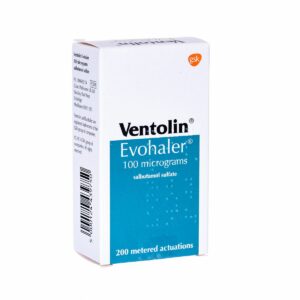
Ventolin Evohaler 100mcg (Blue Asthma Inhaler)
- PRIOR DIAGNOSIS REQUIRED BY OWN GP FOR ORDER TO BE APPROVED!
- Fast Acting Asthma Inhaler Treatment
- Active Ingredient: Salbutomol
-
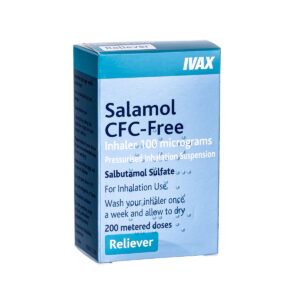
Salamol (Salbutamol) CFC Free Inhaler 100mcg
- PRIOR DIAGNOSIS REQUIRED BY OWN GP FOR ORDER TO BE APPROVED!
- Fast Acting Asthma Treatment
- Active Ingredient: Salbutamol Sulphate
-
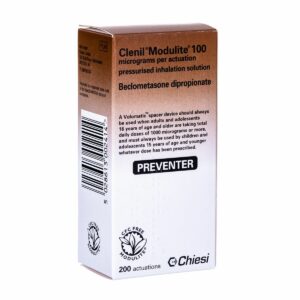
Clenil Modulite (Beclomethasone) Preventer Inhaler
- PRIOR DIAGNOSIS REQUIRED BY OWN GP FOR ORDER TO BE APPROVED!
- Preventative Asthma Treatment
- Reduces Inflamation Over A Long Period
£21.99 – £37.99 Select options This product has multiple variants. The options may be chosen on the product page -
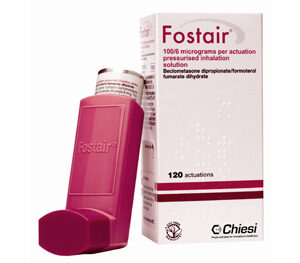
Fostair Pink Asthma Inhaler
- PRIOR DIAGNOSIS REQUIRED BY OWN GP FOR ORDER TO BE APPROVED!
- Fast Acting Asthma Relief And Preventative Treatment
- Active Ingredients: Beclometasone Dipropionate And Formoterol Fumarate Dihydrate
£59.99 Select options This product has multiple variants. The options may be chosen on the product page -
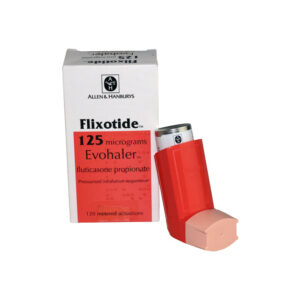
Flixotide Evohaler (Fluticasone)
- PRIOR DIAGNOSIS REQUIRED BY OWN GP FOR ORDER TO BE APPROVED!
- Preventative Asthma Treatment
- Active Ingredient: Fluticasone Propionate
£24.99 – £71.99 Select options This product has multiple variants. The options may be chosen on the product page -

Ventolin Accuhaler 200mcg (Blue Asthma Inhaler)
- PRIOR DIAGNOSIS REQUIRED BY OWN GP FOR ORDER TO BE APPROVED!
- Fast Acting Asthma Inhaler Treatment
- Active Ingredient: Salbutomol
-
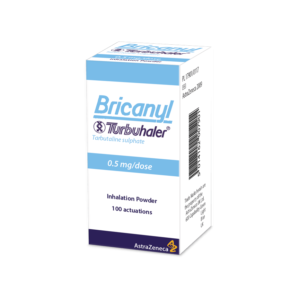
Bricanyl (Terbutaline) 0.5mg Turbo Inhaler
- PRIOR DIAGNOSIS REQUIRED BY OWN GP FOR ORDER TO BE APPROVED!
- Active Ingredient: Terbutaline
- Opens airways to make breathing easier
-
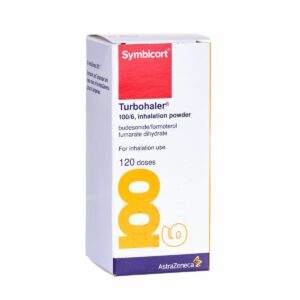
Symbicort (Budesonide & Formoterol) Turbohaler
- PRIOR DIAGNOSIS REQUIRED BY OWN GP FOR ORDER TO BE APPROVED!
- Fast Acting Asthma Relief And Preventative Treatment
- Active Ingredients: Budesonide And Formoterol Fumarate Dihydrate
£54.99 – £60.99 Select options This product has multiple variants. The options may be chosen on the product page -
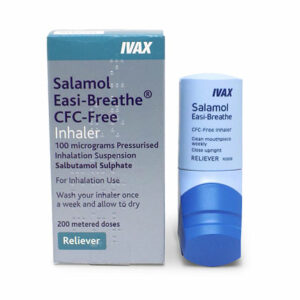
Salamol (Salbutamol) Easi-Breathe CFC Free Inhaler 100mcg
- PRIOR DIAGNOSIS REQUIRED BY OWN GP FOR ORDER TO BE APPROVED!
- Fast Acting Asthma Treatment
- Active Ingredient: Salbutamol Sulphate
-
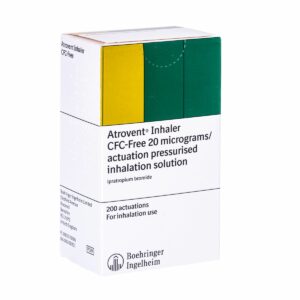
Atrovent (Ipratropium Bromide 20mcg) Inhaler
- PRIOR DIAGNOSIS REQUIRED BY OWN GP FOR ORDER TO BE APPROVED!
- For People With Chronic Asthma Or Chronic Obstructive Pulmonary Disease (COPD)
- Opens Up Airways, Making It Easier To Breathe
-
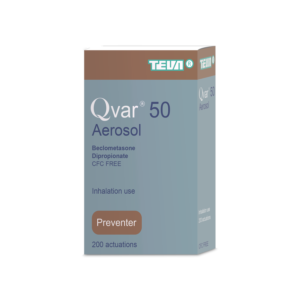
Qvar Aerosol 50mcg/100mcg
- PRIOR DIAGNOSIS REQUIRED BY OWN GP FOR ORDER TO BE APPROVED!
- Preventative Asthma Treatment
- Active Ingredient: Beclomethasone
£26.99 – £37.99 Select options This product has multiple variants. The options may be chosen on the product page -
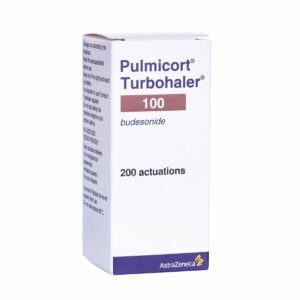
Pulmicort Turbohaler (Budesonide)
- PRIOR DIAGNOSIS REQUIRED BY OWN GP FOR ORDER TO BE APPROVED!
- Preventative Asthma Treatment
- Reduces And Prevents Swelling And Inflammation In The Lungs
£36.99 – £38.99 Select options This product has multiple variants. The options may be chosen on the product page -
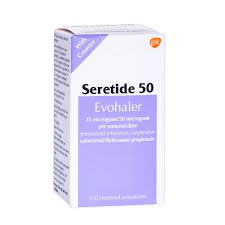
Seretide Evohaler (Fluticasone + Salmetarol)
- PRIOR DIAGNOSIS REQUIRED BY OWN GP FOR ORDER TO BE APPROVED!
- Preventative Asthma Treatment
- Active Ingredients: Fluticasone Propionate And Salmetarol Xinafoate
£41.99 – £63.99 Select options This product has multiple variants. The options may be chosen on the product page -
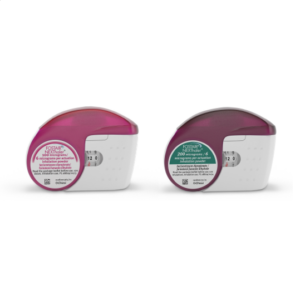
Fostair NEXTHALER (Beclometasone + Formoterol)
- PRIOR DIAGNOSIS REQUIRED BY OWN GP FOR ORDER TO BE APPROVED!
- Fast Acting Asthma Relief And Preventative Treatment
- Active Ingredients: Beclometasone Dipropionate And Formoterol Fumarate Dihydrate
£57.99 – £60.99 Select options This product has multiple variants. The options may be chosen on the product page -
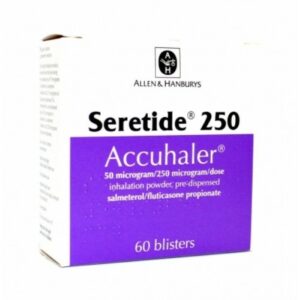
Seretide Accuhaler (Fluticasone, Salmetarol)
- PRIOR DIAGNOSIS REQUIRED BY OWN GP FOR ORDER TO BE APPROVED!
- Preventative Asthma Treatment
- Active Ingredients: Fluticasone Propionate And Salmetarol Xinafoate
£42.99 – £71.99 Select options This product has multiple variants. The options may be chosen on the product page -
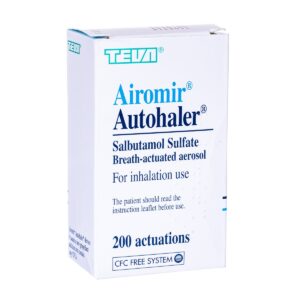
Airomir (Salabutamol) CFC Free Autohaler / Inhaler 100mcg
- PRIOR DIAGNOSIS REQUIRED BY OWN GP FOR ORDER TO BE APPROVED!
- Fast Acting Asthma Treatment
- Active Ingredient: Salbutamol Sulphate
£17.99 – £19.99 Select options This product has multiple variants. The options may be chosen on the product page -
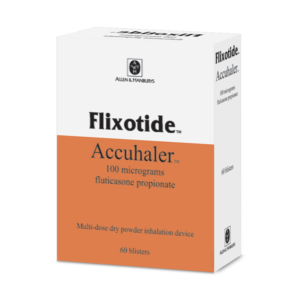
Flixotide (Fluticasone) Accuhaler
- PRIOR DIAGNOSIS REQUIRED BY OWN GP FOR ORDER TO BE APPROVED!
- Preventative Asthma Treatment
- Active Ingredient: Fluticasone Propionate
£23.99 – £78.99 Select options This product has multiple variants. The options may be chosen on the product page -
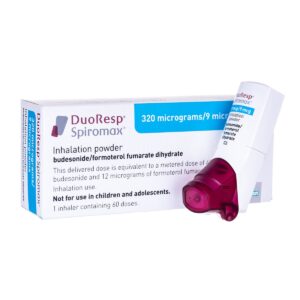
Duoresp Spiromax (Budesonide + Formoterol) Inhaler
- PRIOR DIAGNOSIS REQUIRED BY OWN GP FOR ORDER TO BE APPROVED!
- Preventative Asthma Treatment
- Active Ingredients: Budesonide And Formoterol Fumarate Dihydrate
£58.99 – £60.99 Select options This product has multiple variants. The options may be chosen on the product page -
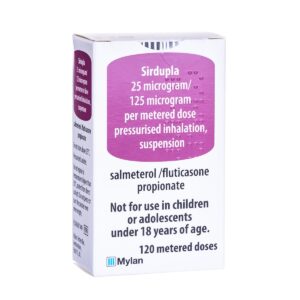
Sirdupla (Fluticasone + Salmetarol) Evohaler
- PRIOR DIAGNOSIS REQUIRED BY OWN GP FOR ORDER TO BE APPROVED!
- Preventative Asthma Treatment
- Active Ingredients: Fluticasone Propionate And Salmetarol Xinafoate
£45.99 – £59.99 Select options This product has multiple variants. The options may be chosen on the product page -
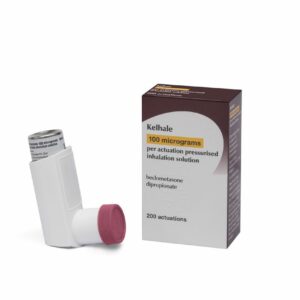
Kelhale Preventer Inhaler
- PRIOR DIAGNOSIS REQUIRED BY OWN GP FOR ORDER TO BE APPROVED!
- Preventative Asthma Treatment
- Reduces Inflamation Over A Long Period
£23.99 Select options This product has multiple variants. The options may be chosen on the product page -
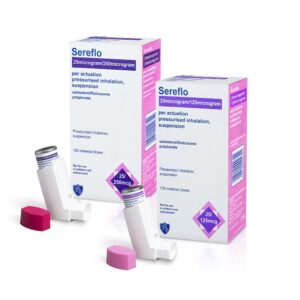
Sereflo Inhaler
- PRIOR DIAGNOSIS REQUIRED BY OWN GP FOR ORDER TO BE APPROVED!
- Preventative Asthma Treatment
- Active Ingredients: Fluticasone And Salmetarol
£32.99 – £37.99 Select options This product has multiple variants. The options may be chosen on the product page -
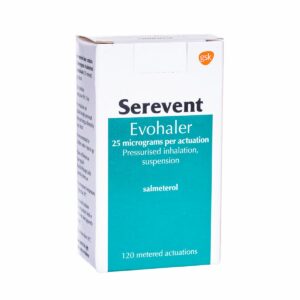
Serevent (Salmetarol) Evohaler 25mcg and Accuhaler 50mcg
- PRIOR DIAGNOSIS REQUIRED BY OWN GP FOR ORDER TO BE APPROVED!
- Preventative Asthma Treatment
- Active Ingredient: Salmetarol Xinafoate
£54.99 – £59.99 Select options This product has multiple variants. The options may be chosen on the product page -
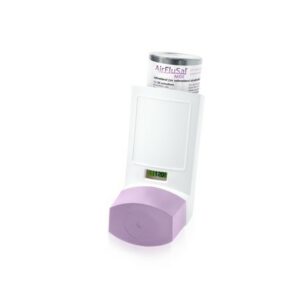
AirFluSal MDI Inhaler
- PRIOR DIAGNOSIS REQUIRED BY OWN GP FOR ORDER TO BE APPROVED!
- COPD Treatment
- Active Ingredients: Fluticasone And Salmetarol
£37.99 – £46.99 Select options This product has multiple variants. The options may be chosen on the product page -
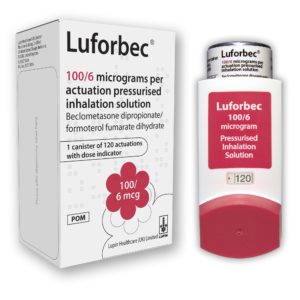
Luforbec 100mcg Inhaler (beclometasone/formoterol)
- Contains Beclometasone Dipropionate & Formoterol Fumarate Dihydrate
- Used for Asthma & Chronic obstructive pulmonary disease
- Inhaled through the mouth and delivered directly to the lungs
-
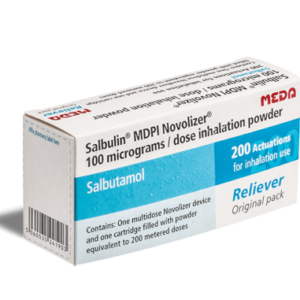
Salbulin Novolizer 100mcg Dry Powder Inhaler
- PRIOR DIAGNOSIS REQUIRED BY OWN GP FOR ORDER TO BE APPROVED!
- Fast Acting Asthma Inhaler Treatment
- Active Ingredient: Salbutomol
-
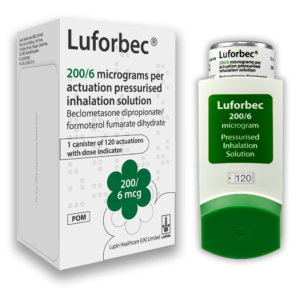
Luforbec 200mcg Inhaler (beclometasone/formoterol)
- Contains Beclometasone Dipropionate & Formoterol Fumarate Dihydrate
- Used for Asthma & Chronic obstructive pulmonary disease
- Inhaled through the mouth and delivered directly to the lungs
-
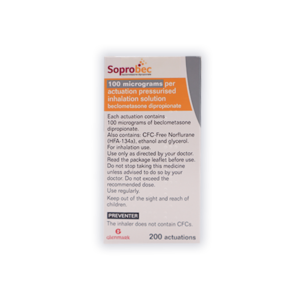
Soprobec Inhaler (Beclometasone)
- PRIOR DIAGNOSIS REQUIRED BY OWN GP FOR ORDER TO BE APPROVED!
- Prevent the symptoms of asthma and prevent an attack
- Contains Beclometasone Dipropionate
£15.99 – £24.99 Select options This product has multiple variants. The options may be chosen on the product page
-
About Asthma
Asthma is a chronic respiratory condition characterized by inflammation and narrowing of the airways, leading to difficulty breathing. It affects people of all ages and can range from mild to severe. Managing asthma effectively involves understanding the condition, recognizing symptoms, obtaining an accurate diagnosis, adhering to appropriate asthma treatment plans, and implementing prevention strategies.
-
Symptoms
Asthma symptoms can vary from person to person, but common signs include:
- Shortness of breath
- Wheezing or whistling sound when breathing
- Chest tightness or pain
- Chronic coughing, especially at night or early morning
- Difficulty sleeping due to breathing problems
If you experience any of these symptoms, it’s essential to consult a healthcare provider for proper evaluation and management.
-
Diagnosis
Diagnosing asthma typically involves a combination of the following:
- Medical history: Your doctor will ask about your symptoms, family history of asthma or allergies, and any potential triggers.
- Physical examination: A thorough examination, including listening to your lungs with a stethoscope.
- Pulmonary function tests (PFTs): These tests measure how well your lungs work, including spirometry, which assesses the amount and speed of air you can exhale.
- Allergy testing: Identifying specific allergens that may trigger your asthma symptoms.
-
Treatments
Asthma treatment aims to control symptoms, prevent asthma attacks, and improve quality of life. Treatment options include:
- Asthma medications: These include quick-relief medications for immediate symptom relief and long-term control medications to manage chronic symptoms.
- Inhalers: The most common form of delivering asthma medications, inhalers come in various types, such as metered-dose inhalers (MDIs) and dry powder inhalers (DPIs).
- Nebulizers: Devices that turn liquid medication into a mist, making it easier to inhale.
- Biologic therapies: Advanced treatments for severe asthma that target specific components of the immune system.
-
Prevention Strategies
Preventing asthma attacks and managing symptoms involves a combination of lifestyle changes and medication adherence. Effective strategies include:
- Identifying and avoiding triggers: Common triggers include allergens (pollen, dust mites, pet dander), smoke, pollution, cold air, and respiratory infections.
- Maintaining a healthy lifestyle: Regular exercise, a balanced diet, and weight management can improve overall respiratory health.
- Following an asthma action plan: A personalized plan provided by your healthcare provider that outlines how to manage your asthma daily and during an attack.
- Regular check-ups: Routine visits to your healthcare provider to monitor your condition and adjust your treatment plan as needed.












